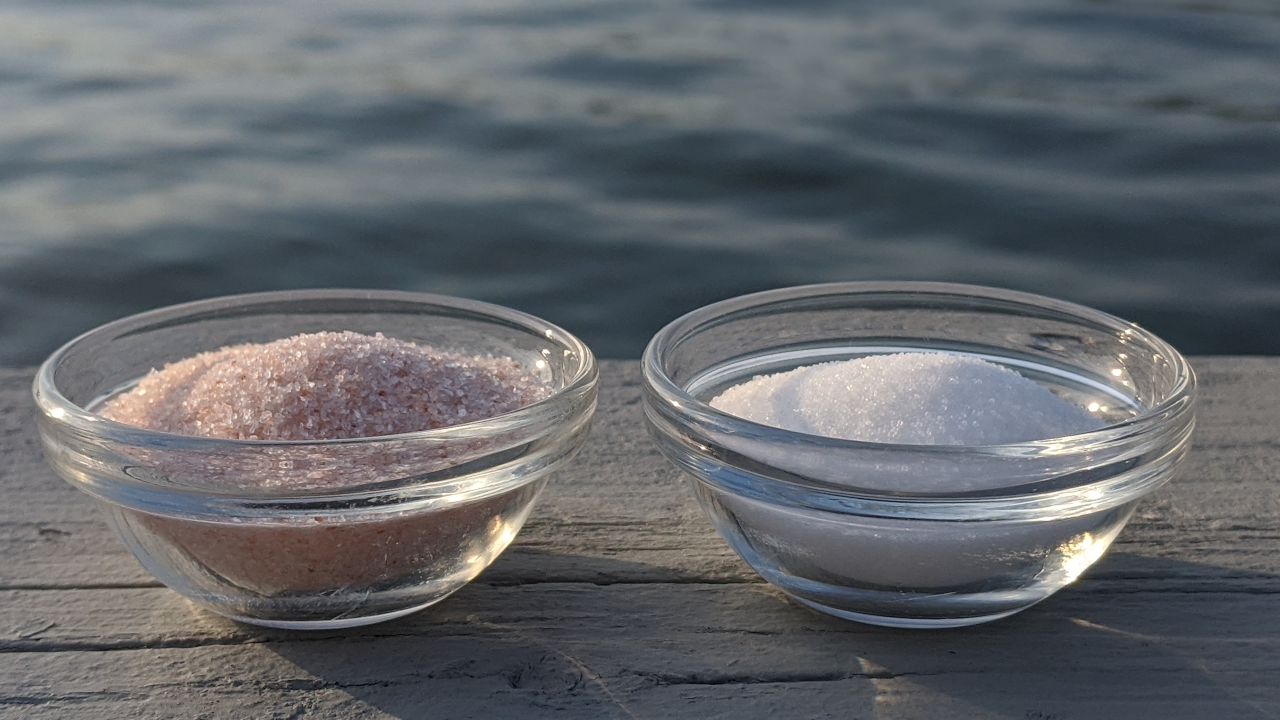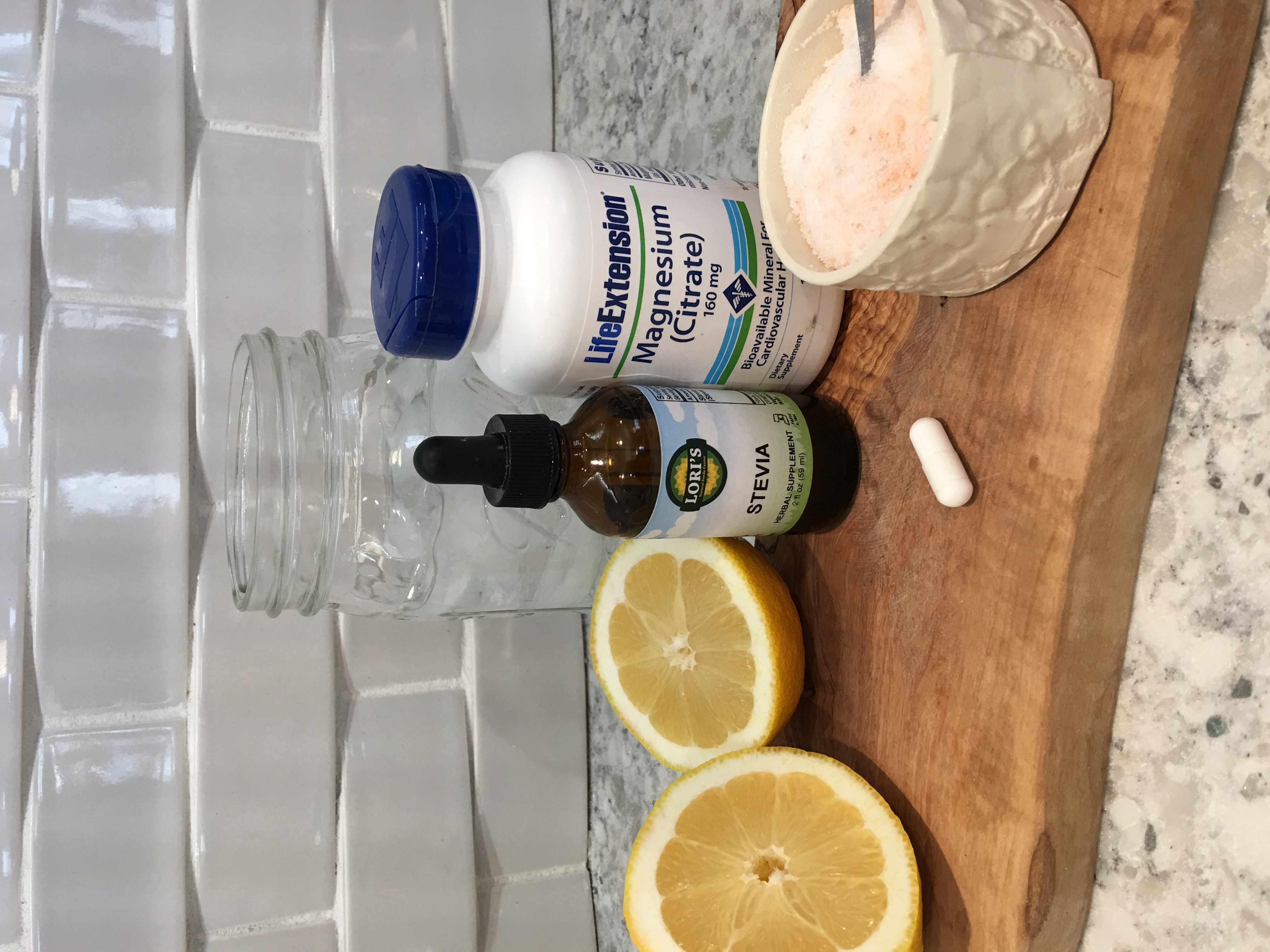Benefits of Lemon Water with Sea Salt

Why on earth would you intentionally drink salt water with lemon in it? Most of us have accidentally gotten sea water in our mouths at some point and it is not a pleasant experience. When this was first recommended to me by my functional medicine doctor, the thought of drinking salt water had about as much appeal as gargling dish soap for better breath. Instead, I just started adding more sea salt to my food. I later found out that drinking salt water and eating salt are two completely different things, but I’ll get to that in a minute.
So, back to the “why”. Sea salt can help balance your potassium and sodium levels. This is actually an issue for many people but they don't realize it. When dissolved in water, potassium and sodium turn into ions which are essential for good functioning of:
- Neurological health
- Cardiovascular system
- Cellular health
- Muscular Health
We are essentially electric organisms: our brain and nervous system needs ions to fire neurons and transmit signals, our heart tissue is firing electrical signals to keep it’s rhythm, our cells need ions to transport things back and forth across the cell membrane and balance fluids.
A good supply of the right balance of ions are critical to our health. Therefore, the amount of electrolytes in the body can affect many crucial functions. This is especially true to people under a lot of stress. Our adrenal glands, which produce our fight and flight response, need a lot of electrolytes to maintain healthy function. This is one of the key recommendations we make to our patients with Adrenal Fatigue.
Isn’t salt bad for us, you ask? Indeed, the sodium that is added to processed foods that many of us eat is table salt. Table salt itself is highly processed which removes most trace minerals and results in approximately 97% sodium chloride. Table salt also has iodine added and anti-caking agents like silicon dioxide, calcium silicate, iron ammonium citrate, and yellow prussiate of soda and may contain aluminum. Aluminum absorbed intravenously has the potential to remain in the body. Excess aluminum has been linked to neurological conditions, certain types of anemia, kidney failure, and the softening of bones.
Sea salt, on the other hand, is made from sea water which contains a complex mixture of trace minerals that our bodies need and has a good balance of both sodium and potassium. Not all sea salts are created equal as you see in the table below. Also, you need to be careful with the source of sea salts as they can come from polluted water and contain microplastics.
Himalayan salt is harvested from an ancient dried up sea in Pakistan so it is not polluted with man-made chemicals. It also has a much higher percentage of potassium than most other sea salts – this balances sodium and potassium.

So why drink it instead of just salting foods? When you drink a fluid without food, it absorbs in the stomach very quickly. This is almost like having an IV. When you salt your food, it needs to be digested and absorbed through the intestines. Many people’s guts are in disrepair and don’t absorb nutrients well.
Drinking your salt water just works better.
Himalayan Sea Salt doesn't have to cost a fortune. We found high quality salt at Costco for around $6 for 5 lbs.
So why add lemon? Lemon makes the salt water taste better, and it has also been shown to help have an alkaline effect on the body. What? Isn’t lemon juice acidic? Yes, but that isn’t how we evaluate alkaline and acidic effect in the body.
When you eat food, it is burned for energy, or metabolized and that creates byproducts. Those byproducts can be acidic or alkaline and put a strain on the kidneys – this is called potential renal acid load (PRAL). Foods such as meat, dairy, and grains increase the PRAL, thus kidneys have to filter out more acid. Alkaline foods such as green leafy vegetables with potassium, calcium, and magnesium and fruits such as – you got it - lemons, reduce the PRAL and help your kidneys!
Whenever I feel sluggish, I drink a glass of lemon salt water and it often gives me a good boost of energy. I even empty a capsule of magnesium citrate in it to replenish my magnesium levels at the same time. My anion gap scores (a measure of acidity in the blood) and blood levels of magnesium increased back to normal levels after drinking this water for only a couple of months. I had been taking capsules of 800mg of magnesium and it wasn’t moving the needle, but once I started drinking just 160mg a day, it made all the difference. For my body, I just absorb much better when I drink my nutrients.
Arbor Health Recipe for Sea Salt Lemon Water
- 3 cups of purified water with ice
- 2 Tablespoons of fresh squeezed lemon juice
- ¼ teaspoon of Himalayan sea salt
- 6 drops of Liquid Stevia (powdered Stevia can be bitter)
- 160 mg of Pure Encapsulations Magnesium Citrate powder (open 1 capsule into water)
Mix well and drink. One hack is to multiply the recipe and make a juice jug full at the beginning of the week and keep it in the fridge. Even my kids like to drink it – it’s like a weak version of lemonade. You can play with the amounts of salt and lemon, but I find that a couple drops of liquid stevia helps to balance the salt. BTW – I highly recommend liquid stevia vs. powdered as the carrier powder can impart a bitter taste. Many people think they don’t like stevia but it is actually the carrier power.
Do be careful and drink the lemon water quickly and then rinse your mouth with water afterwards. The acidity can degrade tooth enamel if you are not careful. You should refrain from brushing your teeth for 30 minutes after drinking things that can soften your enamel. Lemon water is not recommended if you have mouth or stomach ulcers. As an alternative, consider lemon essential oil. It has all the benefits, but the oil is made from the lemon peel, not the fruit. This makes it healthier for your teeth, 1-2 drops in the above recipe is perfect! Glass containers are recommended because they do not react to acids, or leach harmful plastic or metal chemicals into your water.
Voila – home-made Gatorade without all the artificial colors, sugar, and preservatives. Cheers to your health!
Learn more natural and easy ways to support your health from the inside out at our blog. Check out topics such as:
Getting Better Sleep Naturally
Managing Anxiety from the Inside Out
If this resonates with you, request a free 20-minute consultation to see if Functional Medicine might be right for you.
- Amber Ratcliffe, Co-founder of Arbor Health and Justine Shults, Functional Medicine ANP at Arbor Health
This Website has been created to provide information about functional health care services and is for general informational purposes regarding functional health care that should never be construed as medical advice for any person, including patients of the Practice. The Content is not intended to be a substitute for professional medical advice, diagnosis, or treatment. Always seek the advice of your physician or other qualified health provider with any questions you may have regarding a medical condition.











